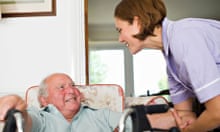The scale of the gathering social care crisis has been underlined by new figures showing the number of older people is expected to outstrip the number of family members able to provide informal care for them for the first time in 2017.
Within four years, it is predicted, 800,000 people may be in need of care, including 20,000 with no family to care for them, according to a report by the centre-left thinktank the IPPR.
By 2030 there will be 2 million people aged over 65 without adult children to look after them, up from 1.2 million in 2012, and about 230,000 of them will be in need of more than 20 hours' care a week and will have no informal support.
The average annual cost for an older person who pays for 10 hours of home care and receives five meals on wheels a week has increased to £7,900 a year – up almost £740 since 2009-10 – and nursing homes now cost an average of £36,000.
The report will accelerate private discussions under way in the Labour party about how it can integrate social care and health services, and whether this will require any kind of earmarked extra spending.
Labour says it has rejected plans for a 1p increase in national insurance contributions, an idea being touted by the former welfare minister Frank Field, but Ed Miliband is known to want to make the future of the health service a big issue at the next election.
Labour is examining a range of funding options in the light of the widely expected shortfall in health and social care funding over the next 10 years.
An independent commission on the future of health and social care in England, overseen by the King's Fund health thinktank and chaired by the economist Kate Barker, could influence Labour thinking.
The director of the IPPR, Nick Pearce, has supported the idea of an earmarked tax, saying the public might be willing to support extra taxes for health care – as they did in the past when the same measure was introduced by Gordon Brown and Tony Blair.
By underlining the likely extra pressures on social care due to demographic change, the IPPR's latest analysis will put pressure on those who are resisting extra spending to propose an alternative.
It suggests that by 2030, an estimated 230,000 older people in England who need care of more than 20 hours a week could be left without family to help.
It adds that the number of people aged 65 and over without children to care for them will almost double before the end of the next decade and that by 2030, there will be more than 2 million people in England without a child to care for them if needed.
Older people will also be under pressure not simply to act as providers of care to their spouses and partners, with some analysis suggesting that they will also have to increase the care they provide by 90% over the next 15 years.
The IPPR suggests the financial costs of care are especially acute in the UK since levels of employment for women with children and those over 50 are lower in the UK than in many other OECD countries.
The report argues that plans for new non-state networks of social care, including friends and neighbours, need to be assembled soon since adult children will not be able to meet demand, or else the level of demand on the NHS will spiral out of control.
It calls for an end to the generational segregation of care so that children and elderly people are not always looked after at different sites, pointing to models of linked care in Germany.
It also proposes a system of care coordinators providing a single local point of contact to replace the care management currently provided by adult social services. .
The report shows 800,000 older people who need personal care are not receiving this, either because eligibility criteria have been cut back – 87% of councils are now providing care only for those with "substantial" or "critical" needs – or because they are unable to afford paid care.
Clare McNeil, the report's author, says: "The supply of unpaid care to older people with support needs by their adult children will not keep pace with future demand. Thousands of people in their 60s and 70s today could be left to cope on their own when they need care in the future, with overstretched services unable to make up the shortfall.
"Britain needs to build new community institutions capable of sustaining us through the changes ahead and to adapt the social structures already in place, such as family and care, public services, the workplace and neighbourhoods."






Comments (…)
Sign in or create your Guardian account to join the discussion